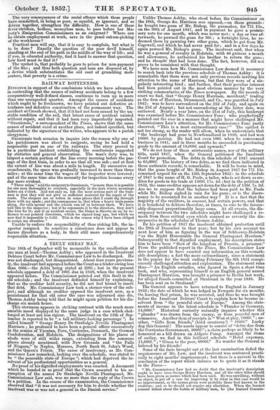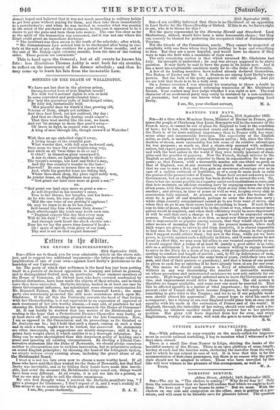A TRULY GREAT MAN.
THE 16th of September will be memorable in the recollection of one man at least—Thomas Ashby ; who appeared in the Insolvent Debtors Court before Mr. Commissioner Law to be discharged. He was not discharged, but disappointed. About four years previous- ly, the insolvent had appeared before the Court as a trader owing less than 5001.—the debts being stated at 299/. ; but in the present schedule appeared a debt of 1001. due in 1848, when the insolvent appeared before. The Commissioner pointed out this fault in the old schedule ; and the insolvent defended himself by explaining, that as the creditor held security, he did not feel bound to insert that debt. Mr. Commissioner Law took a sterner view of the sub- ject; and although no creditor opposed the insolvent now, as a punishment for that old error the case was adjourned sine die, Thomas Ashby being told that he might again petition for his dis- charge six month hence.
This sternness appears in striking contrast with the much more amiable mood displayed by the same judge in a ease which chal- lenged at least not less rigour. The insolvent on the 13th of Sep- tember is reported to be " a tall military-looking personage "; he called himself " George Henry De Strabolgie Neville Plantagenet Harrison ; he professed to have been a general officer successively in the armies of Yucatan, Peru, Corrientes, Denmark, the German Confederation, and Holstein. The designations of his places of abode were of still wider range, extending from the sonorous places already mentioned, with New Grenada and " the Falls of Niagara," to Naples, Morocco, North Bank St. John's Wood, and the Queen's Prison. The cause of insolvency, as Mr. Com- missioner Law remarked, looking over the schedule, was stated to be " the peaceable state of Europe "; which had deprived the in- solvent of his professional opportunities as a general. No proof of his dignified employments was exacted. A. document which he handed in as proof that the Crown assented to his as- sumption of the names De Strabolgie Neville Plantagenet, Mr. Commissioner Law said, was no more than the reply of the Crown to a petition. In the course of the examination, the Commissioner observed that "it was not necessary for him to decide whether the insolvent was or was not a general in the Danish service."
Unlike Thomas Ashliia,r;:vho stood before the Commissioner on the 16th, George &o. Harrison was opposed,—on these grounds : he bought two guns of Mr. Bishop, the gnnmaker, for 771. 13s., on the 30th of August 1847, and in payment he gave a promis- sory note for one month, which was never met ; a day or two af- terwards, he pawned the guns for 30/.; a fortnight later, he re- deemed them by pawning two other guns, which he got from Mr. Cogswell, and which he had never paid for; and in a few days he again pawned Mr. Bishop's guns. The insolvent said, that when' he was a general of cavalry in Holstein, with 40 guineas a month and allowances, he authorized his brother to return the guns ; and he thought that had been done. The fact, however, did not prove to be consistent with that thought. We have seen how Mr. Commissioner Law deemed it necessary to search back into the previous schedule of Thomas Ashby : it is remarkable that there were not only previous records inviting his attention te,the name of Harrison, but that they were of a sin- gularly interesting kind ; and further, that their peculiar interest had been pointed out in the most obvious manner by the very striking commentaries of the Times newspaper. By the records of court we find, that " George Henry Harrison, merchant," trading as the firm of Harrison, Drummond, and Co., was gazetted in July 1842 ; was to have surrendered on the 22d of July, and again on the 23d of August ; but not surrendering at the latter date, was outlawed. Nearly a year later, on the 21st of July, this bankrupt was examinea'before Mr. Commissioner Fane ; who prophetically pointed out the case in a manner that might have challenged Mr. Commissioner Law's attention, for Mr. Commissioner Pane justly observed, " This is a most extraordinary case !" The epithet is not too strong, as the reader will allow, when he understands that "the bankrupt had gone to Newfoundland in 1840, and had won 1000/. by gaming. He had not even 1001. when he "commenced business in 1841, and in three months he succeeded in purchasing goods to the amount of 18,000/. and upwards."
We do not hear of those aristocratic names, nor of the military title, until 1847, when the General petitioned the Insolvent Court for protection. The debts in this schedule of 1847 amount to 65,000/. The history of two debts, as we find them indicated in i
these authentic records, is remarkable. It will be borne in mind, that the guns bought of Mr. Bishop in August 1847 for 771. 13s. remained unpaid for on the 13th September 1852: in the schedule of 1847 is the name of H. G. Poole, a tailor, who is set dowii as cre- ditor for goods in his trade at 15691. 17s. 4d. ; but in the Petition of 1852, the same creditor appears set down for the debt of 1391. 78. 3d. Are we to suppose that the balance had been paid to Mr. Poole while Mr. Bishop sighed in vain for his guns ; or is the discre- pancy to be accounted for in another way ? It is a fact that the majority of the creditors, in amount, had certain powers, and that it is beneficial to debtors therefore, at times, to owe to the favour- ably-disposed proportionably large sums. At all events, the dis- crepancy between the two schedules might have challenged a re- mark from those critical eyes which scanned so severely the dis- crepancies in the schedules of Thomas Ashby. By his petition of 1847 the insolvent obtained protection until the 29th of December in that year; but by his own account we next hear of him as figuring in the war of Schleswig-Holstein " as the Right Honourable the General Plantagenet Harrison." Subsequently, to that dignified employment, his description states him to have been " then of the kingdom of Prussia, a prisoner." From the published report in the Times, Mr. Commissioner Law does not appear to have exacted any information on this remark- able description ; a fact the more extraordinary, since a statement in the papers for the week ending February the 8th 1851 conspi.: cuously challenged attention and explanation. The statement runs thus—" An English swindler, who figured in Spain a short time back, and who, representing himself as an English general named Plantagenet Harrison, was brought a prisoner to Berlin last week, for alleged frauds committed at Stralsund in the year 1848. He has been sent on to Stralsund."
The General appears to have returned to England in January 1852 ; the date at which he was lodged in Newgate for six months. On leaving that prison, he was arrested, and thus he was brought before the Insolvent Debtors' Court to explain how he became in- solvent from " the peaceful state of Europe." Among the state- ments of income in the latest schedule is "Plunder in Germany, 14,000!." Historical curiosity naturally inquires whether this " plunder " was drawn from the enemy, or from peaceful men of commerce. Another item of receipts is Won at play, 7000/. " ; an- other, " Gifts from friends," (kind creatures !) " 10001." Lucky dog this General ! The assets appear to consist of "debts due from the Corrientes Government, 30001."; a claim perhaps as likely to be honoured as a bill drawn on Aldgate Pump. Amongst the items of outlay, we find in this brilliant schedule "Hotel expenses, 11,000/. ; " Given to the poor, 6000!." No wonder the General is beloved by his friends !
Some of the facts brought out at the last examination defied the acquiescence of Mr. Law, and the insolvent was sentenced practi- cally to eight months' imprisonment; but there is a naivete in the conclusion of the report which induces us to quote it as it stands in the Times- " Mr. Commissioner Law had no doubt that the insolvent's description ought to have been George Henry Harrison, and all the other titles should have been given as names which had been used. He was unwilling, without an object, to put off a case for improving it by what in this case would be no improvement, as the names given were probably those best known to the creditors; and so he should not require any alteration. When the learned counsel talked about the habits of military men, he (the learned Commis-
!loner) hoped and believed that it was not much according to military habits to get four guns without paying for them, and then take them immediately to a pawnbroker's ; and when he was invited to consider what was passing in the mind of the purchaser at the moment, in this case it appeared to be a desire to get the guns and turn them into money. The case was clear as far as the spirit of the transaction was concerned, and it was not one where the Court could grant an immediate discharge. " The insolvent was then sworn to the truth of the schedule ; after which, " Mr. Commissioner Law ordered him to be discharged after being in cus- tody at the suit of any of the creditors for a period of three months, and at the suit of Mr. Bishop eight calendar months, from the date of the vesting order. These periods are concurrent."
This is hard upon the General ; but at all events he knows his fate : less illustrious Thomas Ashby is sent back for six months, to reflect on the inaccuracy of his former schedule ; and then he may come np to learn his fate from the inexorable Law.



























 Previous page
Previous page